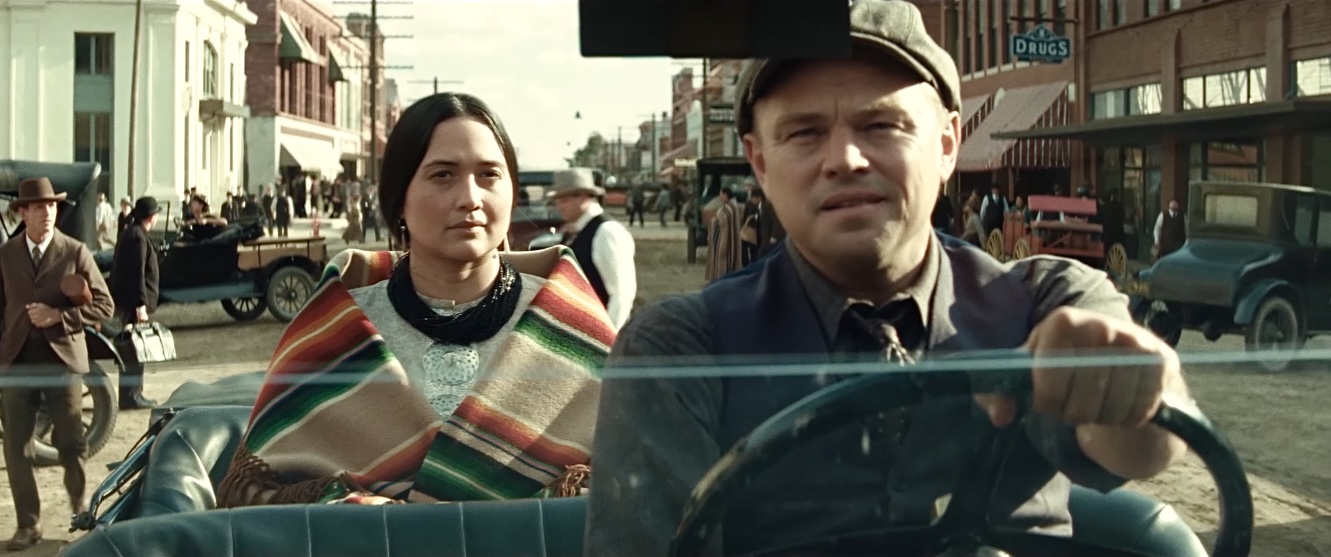
Allow me to make this disclaimer: I’m going to begin this review in the next paragraph with a pair of words I almost never allow myself to use in a movie review – “I think.” I don’t allow those words in my reviews because the “I think” is implied in the context of a review. Of course “I think” this. That’s why I wrote it. “I think” tends to creep into a movie review when the reviewer wants to distance him or herself from the opinion being presented. It’s a kind of hedge against objection the reader may have to the opinion the reviewer is expressing. The reader feels the writer’s hesitation. Appearing meek behind an “I think,” the reviewer hopes for mercy from the reader. Own your opinion, I tell myself. Defend it, and if you can’t own it or defend it, don’t write it. But I’m going to break my rule in this review. I’ll explain why as we go.
I think Killers of the Flower Moon is an indictment against America. That it might be should come as no surprise. After all, this is a story about white men killing Native Americans in order to steal their land and oil rights. The indictment is basically implied. The film is also written by Eric Roth who tends to write stories about individuals who represent peoples and nations, stories like Forest Gump, Munich, the adaptation of Extremely Loud and Incredibly Close. And the film is directed by Martin Scorsese, a filmmaker who has been extirpating what is inherently sinful in America’s soul as long as he has been making movies.
And though the story is bound to time and place—this is a true story, after all—the particular foci of the indictment are shockingly contemporary. Here we have dim good ol’ boys being hornswoggled by a power-hungry con man feigning religious affections to mask his true intentions. (There are moments in this film when you remember that DiCaprio and De Niro are among the best there’s ever been, though overall their characters are more interesting than their performances.) Here we have good people kept addicted and sick in order to control them and temper any initiative. (I look forward to Lily Gladstone winning an Oscar for her performance in this film. I hope it means we get to see her in many more kinds of movies.) Here we have a legal system bought by the highest bidder. Here we have a complete disregard for the law. Here we have religion that is merely cultural and not confessional, a club, not a calling. Here we have white supremacists parading through the streets and people barely bat an eye. Here we have a true crime obsession that turns real tragedy and heartache into entertainment. Here we have greed as the true and only motivation of both the afflicted and the afflicters, a terrible curse borne by all.
So I think Killers of the Flower Moon is an indictment, but I couch my critical opinion in those two words because Killers of the Flower Moon also isn’t as biting as Scorsese’s other indictments of American greed. The film is milder than, say, Gangs of New York or The Wolf of Wall Street. It’s nowhere near as entrancing and then devastating as Goodfellas, Taxi Driver, or The Irishman. It isn’t even as cynical as The Departed. It is certainly from the same filmmaker who made those films though. In many, many ways it’s another mob movie, but, in its best moments, it’s touched by a reach toward the sublime a la The Last Temptation of Christ, Kundun, and Silence. Maybe that respect for Osage spirituality is what tempers the imputation and makes the film feel more mild. How biting can your Jeremiad be, really, if you keep in view an eternal justice and mercy that no evil can ultimately destroy?
So I think Killers of the Flower Moon is an indictment, but it might be a testimony. It might be Scorsese standing in front of an edifice to evil and declaring “And yet I believe that love and compassion and goodness and justice will reign long after these greedy men have slipped into the obscurity of the grave.” It can be both things, the indictment and the testimony, for sure, but I think at heart it might be the latter. I hope when I’m Scorsese’s age and I have spent another lifetime peering into the heart of America and looking for hope, I too can still believe in the resiliency of goodness. With guides like Scorsese, I can. I think.
Allow me to make this disclaimer: I’m going to begin this review in the next paragraph with a pair of words I almost never allow myself to use in a movie review – “I think.” I don’t allow those words in my reviews because the “I think” is implied in the context of a review. Of course “I think” this. That’s why I wrote it. “I think” tends to creep into a movie review when the reviewer wants to distance him or herself from the opinion being presented. It’s a kind of hedge against objection the reader may have to the opinion the reviewer is expressing. The reader feels the writer’s hesitation. Appearing meek behind an “I think,” the reviewer hopes for mercy from the reader. Own your opinion, I tell myself. Defend it, and if you can’t own it or defend it, don’t write it. But I’m going to break my rule in this review. I’ll explain why as we go.
I think Killers of the Flower Moon is an indictment against America. That it might be should come as no surprise. After all, this is a story about white men killing Native Americans in order to steal their land and oil rights. The indictment is basically implied. The film is also written by Eric Roth who tends to write stories about individuals who represent peoples and nations, stories like Forest Gump, Munich, the adaptation of Extremely Loud and Incredibly Close. And the film is directed by Martin Scorsese, a filmmaker who has been extirpating what is inherently sinful in America’s soul as long as he has been making movies.
And though the story is bound to time and place—this is a true story, after all—the particular foci of the indictment are shockingly contemporary. Here we have dim good ol’ boys being hornswoggled by a power-hungry con man feigning religious affections to mask his true intentions. (There are moments in this film when you remember that DiCaprio and De Niro are among the best there’s ever been, though overall their characters are more interesting than their performances.) Here we have good people kept addicted and sick in order to control them and temper any initiative. (I look forward to Lily Gladstone winning an Oscar for her performance in this film. I hope it means we get to see her in many more kinds of movies.) Here we have a legal system bought by the highest bidder. Here we have a complete disregard for the law. Here we have religion that is merely cultural and not confessional, a club, not a calling. Here we have white supremacists parading through the streets and people barely bat an eye. Here we have a true crime obsession that turns real tragedy and heartache into entertainment. Here we have greed as the true and only motivation of both the afflicted and the afflicters, a terrible curse borne by all.
So I think Killers of the Flower Moon is an indictment, but I couch my critical opinion in those two words because Killers of the Flower Moon also isn’t as biting as Scorsese’s other indictments of American greed. The film is milder than, say, Gangs of New York or The Wolf of Wall Street. It’s nowhere near as entrancing and then devastating as Goodfellas, Taxi Driver, or The Irishman. It isn’t even as cynical as The Departed. It is certainly from the same filmmaker who made those films though. In many, many ways it’s another mob movie, but, in its best moments, it’s touched by a reach toward the sublime a la The Last Temptation of Christ, Kundun, and Silence. Maybe that respect for Osage spirituality is what tempers the imputation and makes the film feel more mild. How biting can your Jeremiad be, really, if you keep in view an eternal justice and mercy that no evil can ultimately destroy?
So I think Killers of the Flower Moon is an indictment, but it might be a testimony. It might be Scorsese standing in front of an edifice to evil and declaring “And yet I believe that love and compassion and goodness and justice will reign long after these greedy men have slipped into the obscurity of the grave.” It can be both things, the indictment and the testimony, for sure, but I think at heart it might be the latter. I hope when I’m Scorsese’s age and I have spent another lifetime peering into the heart of America and looking for hope, I too can still believe in the resiliency of goodness. With guides like Scorsese, I can. I think.

Elijah Davidson is Co-Director of Brehm Film and Senior Film Critic. Subscribe to Come & See, his weekly newsletter that guides you through the greatest films ever made, and find more of his work at elijahdavidson.com.
The Dial of Destiny is diverting enough. It’s the best version of an Indiana Jones knock-off, but it’s still a knock-off.